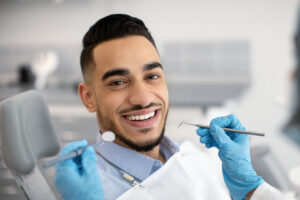-
What’s the Average Age for a Root Canal?
Analyzing the Data
Root canal therapy is a prevalent dental procedure often viewed with apprehension and misconceptions. Many people associate it with pain, but in reality, this treatment is a crucial intervention for saving teeth that are at risk of being lost due to severe infection or decay. Despite its daunting reputation, the procedure itself is a routine part of modern dentistry, designed to relieve pain and preserve the natural tooth. In this article, we will explore the average age at which individuals typically experience their first root canal. By examining who typically needs a root canal and why, we aim to provide insights that alleviate fear and promote better dental health awareness. Continue reading “What’s the Average Age for a Root Canal?”
-
The Ultimate Guide to Tackling Tooth Sensitivity
Understanding and Managing Tooth Sensitivity
Tooth sensitivity is a common dental issue that affects many people worldwide. It’s defined by a sharp pain or discomfort in the teeth when exposed to certain stimuli, including cold, hot, sweet, or acidic foods and drinks. The sensation can be temporary or chronic, but regardless of its duration, it significantly impacts one’s quality of life. This guide aims to provide comprehensive insights into the causes of tooth sensitivity and offer practical solutions to manage and reduce it effectively. Continue reading “The Ultimate Guide to Tackling Tooth Sensitivity”
-
A Guide to Understanding Dental Insurance

Man using his dental benefits to visit dentist
Understanding Dental Insurance
Dental insurance is a critical component of healthcare that often goes underappreciated until the need arises for routine cleanings, unexpected fillings, or more significant procedures like crowns and bridges. Understanding the intricacies of dental insurance can save you from unexpected expenses and help you maximize the benefits you’re entitled to. This guide, drawing from a comprehensive overview of dental insurance basics, aims to clarify the subject and provide practical advice for navigating dental insurance plans effectively.
Understanding the Basics
Dental insurance functions similarly to health insurance but is specifically designed to cover dental care. Plans typically cover preventive services such as exams and cleanings, basic procedures like fillings, and more complex treatments including root canals and crowns. Understanding your plan’s structure—monthly premiums, annual maximums, deductibles, and copays or coinsurance—is essential for making informed decisions about your dental care.
Key Terms Explained
Navigating dental insurance requires familiarity with several key terms:
In-Network vs. Out-of-Network: Choosing in-network providers can significantly reduce out-of-pocket costs, thanks to negotiated rates.
Coverage Tiers: Dental services are often categorized into preventive, basic, and major services, each with varying levels of coverage.
Waiting Periods: Some plans impose waiting periods before certain benefits can be utilized, affecting when you can receive specific treatments.
Maximizing Your Benefits
To get the most out of your dental insurance:
Stay In-Network: Opt for providers within your plan’s network to enjoy lower rates.
Regular Preventive Care: Leverage your plan’s coverage for preventive care to maintain oral health and detect issues early.
Understand Your Plan: Familiarize yourself with the details of your coverage, including limitations and exclusions, to avoid surprises.
Choosing the Right Plan
Picking the right dental insurance plan requires consideration of your dental health needs, budget, and the plan’s coverage specifics. Plans vary in terms of monthly premiums, deductibles, annual maximums, and coverage details for different types of dental care. Whether it’s a PPO, which offers flexibility in choosing providers, or a DMO, which typically offers lower costs but requires you to stay within a network, understanding the differences is crucial.
Practical Considerations
Costs: Dental insurance can significantly reduce out-of-pocket expenses for dental care, but it’s important to compare the costs of premiums against potential out-of-pocket savings.
Eligibility: Dental insurance is accessible to individuals regardless of employment status, with options available for students, part-time workers, and those in transition.
Timing: Unlike health insurance, dental insurance can often be purchased at any time, providing flexibility for those needing immediate coverage.
Stay Informed
A thorough understanding of dental insurance not only helps in selecting the right plan but also ensures that you can make the most of your benefits while minimizing out-of-pocket expenses. Regular reviews of your dental insurance plan, staying informed about the coverage and exclusions, and making strategic decisions about dental care can lead to significant savings and a healthier smile.
Park 56 Dental is here for you in New York, delivering top-quality care since 1997. Our expert team offers a wide range of treatments from pediatric to sedation dentistry, ensuring personalized care for every patient. Experience the difference with a complimentary consultation where we’ll address your sensitivity concerns and guide you toward the best treatment options. Enjoy a comfortable dental visit with our modern practice and diverse insurance plan acceptance. Schedule with us today online or at 646-679-3973 and take the first step toward tackling tooth sensitivity with confidence!
-
Flu, Allergies, or Tooth Ache?

Woman unsure if she’s experiencing flu, allergy, or tooth ache symptoms.
Seasonal Health Dilemmas
Navigating the murky waters of cold weather ailments, many of us find ourselves puzzled: Is it the flu, allergies, or just a toothache? This confusion is not unfounded, as the symptoms of these conditions often overlap, affecting our oral health in unexpected ways.
The Flu and Oral Health
The common cold and the flu are notorious for causing discomfort beyond just a runny nose or a cough; they can also lead to tooth pain. This is primarily due to the close relationship between our sinuses and oral health. When we’re battling a cold or the flu, the inflammation in our sinuses can exert pressure on our dental nerves, particularly those near the upper teeth, causing a sensation that mimics tooth pain. This phenomenon, often mistaken for dental issues, is actually a side effect of our bodies fighting off the infection.
Medications and Oral Hygiene
Moreover, our oral health can take a hit during illness due to the medications we consume. Decongestants, while relieving nasal congestion, can lead to dry mouth by reducing saliva flow. Saliva is important for washing away food particles and bacteria, protecting our teeth and gums. A decrease in saliva can increase the risk of tooth decay and gum disease, exacerbating the sensation of tooth pain.
Allergies and Tooth Pain
Seasonal allergies compound this issue by affecting our oral cavity. Allergies can lead to sinus congestion and inflammation, putting pressure on our teeth and causing pain, particularly in the upper molars. This pressure is often due to the swelling of the sinus tissues, which, in turn, press against the roots of the teeth. The use of antihistamines, a common remedy for allergies, can also contribute to dry mouth, further increasing the risk of dental discomfort.
Maintaining Oral Health During Illness
Maintaining oral hygiene becomes even more crucial when we’re under the weather. Brushing, flossing, and staying hydrated can mitigate the effects of colds, the flu, and allergies on our oral health. However, distinguishing between a toothache caused by sinus pressure and one resulting from dental issues is essential. If tooth pain persists beyond the illness or is localized to one tooth, it may be time to consult a dentist.
Navigating Oral Health Through Seasonal Challenges
In conclusion, while the flu, allergies, and toothaches may present with similar symptoms, understanding their interconnections can help us better manage our health during these trying times. Regular dental check-ups, along with proper hygiene practices, can go a long way in keeping our teeth and gums healthy, regardless of the seasonal challenges we face.
Need assistance with a toothache?
Park 56 Dental has been the trusted solution in NYC since 1997. Our skilled team offers personalized care, from pediatric to sedation dentistry. Book a complimentary consultation today to address your sensitivity concerns and explore tailored treatment options. Experience comfort and convenience with our modern practice and comprehensive insurance coverage. Schedule your visit online or at 646-679-3973 now and start your journey to a sensitivity-free smile!
-
Restorative Dentistry: Your Options for a Full Smile Makeover

Woman with a healthy, beautiful smile.
Restorative Dentistry – Regain Your Smile
Restorative dentistry offers a beacon of hope for those looking to rejuvenate their smiles. This field encompasses a range of procedures designed to repair or replace damaged or missing teeth, improve oral health, and enhance the cosmetic appearance of one’s smile. Among the many options available, some of the most transformative include teeth whitening, contouring/tooth reshaping, bonding, bridges, veneers, dental implants, tooth-colored fillings, and comprehensive smile makeovers.
Teeth Whitening stands out as a popular choice for those seeking to brighten their smile, effectively removing stains and discoloration to reveal a whiter, more radiant set of teeth. It’s a simple yet powerful way to enhance your smile’s aesthetic appeal.
Contouring/Tooth Reshaping is a subtle art that involves altering the shape, length, or surface of one’s teeth to create a more harmonious appearance. This procedure can correct minor imperfections and bring a balanced look to your smile.
Bonding utilizes tooth-colored materials to repair chips, cracks, or gaps in teeth. It’s a quick and effective way to restore the integrity and appearance of teeth with minor damage.
Bridges are used to replace one or more missing teeth, bridging the gap between existing teeth with artificial replacements supported by crowns on either side. This solution restores functionality and aesthetics to your smile.
Veneers offer a transformative approach to correcting cosmetic flaws. These thin, custom-made casings cover the front surface of teeth, addressing issues such as discoloration, misalignment, or uneven sizes.
Dental Implants are a durable and natural-looking option for replacing missing teeth. They involve anchoring a titanium post in the jawbone, topped with a custom crown, to mimic the look and function of natural teeth.
Tooth-Colored Fillings provide a more aesthetically pleasing alternative to traditional metal fillings, blending seamlessly with your natural tooth color to repair cavities without compromising the look of your smile.
Smile Makeovers involve a comprehensive assessment and combination of various restorative and cosmetic procedures tailored to achieve your dream smile. This customized approach considers your facial appearance, skin tone, hair color, teeth, gum tissue, and lips to design a perfect smile.
Restorative Dental Care Options to Suit Your Needs
Each of these options offers its own set of benefits, catering to different needs and preferences. Whether you’re looking to address functional issues, enhance the cosmetic appearance of your teeth, or both, restorative dentistry has a solution. A consultation with a skilled dentist can help determine the best approach for your situation, ensuring that you receive personalized care designed to achieve lasting results. With advancements in dental technology and techniques, achieving a full smile makeover is more accessible and effective than ever, offering a pathway to not only improved oral health but also a boost in confidence and quality of life.
Looking for restorative dental care?
Park 56 Dental in New York is your top solution, delivering quality care since 1997. Our expert team provides personalized treatments spanning pediatric to sedation dentistry. Experience the difference with a complimentary consultation, where we’ll address your sensitivity concerns and guide you toward optimal treatment options. Enjoy a comfortable visit with our modern practice and diverse insurance plan acceptance. Schedule with us today online or at 646-679-3973 and take the first step toward tackling tooth sensitivity with confidence!
-
The Benefits of Good Oral Hygiene Habits

Young woman with good dental hygiene habits.
We know a lot about the fact that it’s important to keep a clean mouth. We also know that the way to a clean mouth is by brushing, flossing, and regular dental visits. What are the reasons we want to keep a clean mouth? Here are some facts about oral hygiene, including some tips you may not have known about keeping those pearly whites nice and healthy!
- Keeping Your Teeth
This one may seem obvious, but some people don’t realize how easy it is for teeth to fall out of an unhealthy smile. It’s not only tooth decay, but there are other ways you can easily lose teeth. Gum disease is another way that teeth can fall out. We need our teeth to enjoy those delicious, healthy foods. Not only that, those who keep all of their teeth for life are likely to live longer than those without all of their 20 teeth. So do your best to keep a clean mouth and healthy teeth. - Lowers Risk of Sickness and Disease-This is a big one. Did you know that keeping your teeth clean can greatly reduce your risk of serious illness? It’s a fact. Here are some facts about disease that you maybe didn’t know.
- Covid-Recent studies have shown that keeping your mouth clean can reduce your risk of suffering a fatal outcome from covid. Keep your mouth clean and reduce your risks.
- Heart Disease-Gum disease and periodontal disease have been linked to heart disease according to the CDC. It is theorized that bacteria from the gums enter the bloodstream and affect the cardiovascular system.
- Cancer-As if that weren’t enough, gum disease has been linked to certain cancers as well. In fact, those with gum disease are 14% more likely to experience some form of cancer in their lifetime. Those with gum disease are more likely to develop gall bladder cancer, breast cancer, esophageal cancer, and skin cancer.
- Dementia-Another big one, this one is hard to hear. But there is a 70% greater chance of developing dementia for someone who has unhealthy gums than for someone who has healthy gums. Gum disease is a very serious affliction.
- Having a Healthy Baby
Moms who have healthy mouths are much less likely to have premature babies or babies with low birth weight. If you are pregnant, keep those teeth nice and clean and you will increase your beautiful baby’s chance at a healthy birth. - Staying Gorgeous
Keeping all your teeth means you’re just one step closer to lifelong beauty. Regular brushing, flossing, and dental exams will help you keep the wonderful smile you were born with and that is very important. Whether it’s a first date, a job interview, or your first day at college, having a healthy and attractive smile means you’re able to put your best foot forward in every situation.
Park 56 Dental
When you are looking for the best advice about how to keep a healthy mouth and a healthy body the best place in New York is Park 56 Dental. Voted the number one dentist in the New York area, we have everything you need for perfecting that beautiful smile. For more information about or to ask any questions about your teeth, visit our website or give us a call at (646) 679-3973. - Keeping Your Teeth
-
The Hidden Dangers of Not Addressing Dental Problems

Woman addressing dental issues.
Taking care of our oral health seems like a basic task that most of us brush off as unimportant. But did you know that the health of your mouth and teeth is intricately connected to the health of your entire body? It is true- dental problems can cause serious, sometimes lethal, health issues. In this blog, we will discuss how neglecting dental problems can lead to severe health concerns and how to prevent them.
How Are Oral and Systemic Health Connected?
The truth is that your mouth is a prime entry point for bacteria and germs. These harmful microorganisms can infiltrate your bloodstream, creating health problems in your body. In fact, according to the American Dental Association, studies have shown that there is a link between stroke, diabetes, heart disease, preterm labor and birth weight, and bacterial infections that start in the mouth.
Your Immune System
A robust immune system is pivotal in fighting pathogens and infections that may be present in our bodies. By neglecting dental problems, we weaken our immune system, which exposes us to dangerous diseases and health issues. Poor oral health can strain our immune system, leaving it less equipped to fight off harmful invaders like bacteria or viruses.
Inflammation
Stress, unhealthy diets, and infections in your gums and teeth can cause inflammation throughout your body. Inflammation is the body’s natural response to injury or infection. However, chronic inflammation is harmful and can lead to bigger health issues such as cancer, heart disease, stroke, and diabetes, to name a few. The link between oral health and inflammation makes it crucial to take care of our dental issues, both big and small.
The Stages of Gum Disease and Its Threat to Overall Health
Gum disease, also known as periodontal disease, is a serious problem that affects the soft tissue and bone that supports your teeth. Gum disease is prevalent, affecting nearly half of adults over the age of 30 in the United States, according to the Centers for Disease Control and Prevention (CDC). While many may think gum disease is just a minor dental issue, it can cause significant health problems if left untreated. Gum disease can lead to tooth loss, chronic bad breath, and has links to heart disease, stroke, and diabetes.
How to Practice Preventive Dental Care and Why
The best way to avoid the dangers of neglected dental problems is to practice preventative dental care. Regular brushing and flossing, cleaning your tongue, maintaining a healthy diet, and visiting your dentist at least once a year can prevent dental problems from occurring. Brushing and flossing help remove plaque that can cause cavities, gum disease, and bad breath. Regular visits to your dentist enable them to detect and treat any oral health issues, prevent tooth decay, and gum disease, prevent oral cancer, and keep your teeth and gums healthy.
Make an Appointment Today with Park 56 Dental
It is imperative to take good care of your teeth to avoid any dental problems that could lead to significant health issues. By brushing and flossing regularly, eating a healthy diet, and visiting your dentist regularly, you can help reduce the risk of alarming health problems. At Park 56 Dental, our team of experts is committed to helping you maintain your optimal oral health. Contact us today to schedule your consultation.
-
Dental Care for Seniors: Addressing Age-specific Oral Health Challenges

Senior couple brushing their teeth.
As the population continues to age, dental professionals are faced with unique challenges when caring for older patients. Aging comes with a plethora of physical changes and medical conditions that can complicate oral health, making it critical to address age-specific challenges. This article will provide insight into the common oral health challenges that seniors face and how dental professionals can effectively address them.
Physical and Health Comorbidities
As individuals age, it’s not unusual for them to face certain health conditions like hypertension and diabetes. This can lead to a weakened immune system, making seniors more susceptible to oral diseases. Dental professionals take note of these concerns when treating older adults. They understand that seniors may not be able to handle invasive procedures like dental extractions or root canals due to their health situation.
Medication Use
The average senior adult is most likely using at least one prescription medication in addition to several over-the-counter drugs. Because of this, dentists ask patients to report all medication use so that they can ensure they safely administer drugs like local anesthetics and analgesics. Some medications can cause dry mouth and other oral health conditions that your dentist will need to address.
Physical Sensory and Cognitive Impairment
Like every other medical condition, aging can bring about physical, sensory, and cognitive impairments that can make oral healthcare challenging. Physical impairments, such as arthritis, can often make handling a toothbrush, floss, or dentures difficult. Some seniors may also experience sensory impairments like blindness or hearing loss, which hampers communication. Cognitive impairments such as dementia also make it critical for caregivers or family members to be present to ensure their dental care is proper and effective.
Dental Conditions that Include Dry Mouth
Dry mouth or xerostomia is typical among aging adults and can lead to tooth decay, gum disease, and other oral health issues. Dental professionals take dry mouth seriously and can help them ascertain if medications cause dry mouth and how to take appropriate action.
Coronal Caries and Periodontitis
Older adults with coronal caries and periodontitis are more likely to have complex dental needs and limited access to care. This is due to the comorbid health condition, physical impairments, and fear of dental procedures. Pathologies like periodontitis need to be addressed by dental professionals to reduce the risk of tooth loss, which can lead to other serious health problems.
The Team at Park 56 Dental is Equipped for All Your Dental Needs—Whatever Your Age!
At Park 56 Dental, we take a personalized approach when caring for older adults. We understand that effective communication, routine dental exams, and preventive oral care measures are vital to maintaining oral health. Additionally, we create treatment plans that factor in comorbid health conditions, medication use, physical impairments, and cognitive and sensory impairments to achieve optimal healthcare outcomes for seniors. By understanding and addressing age-specific oral health challenges, our team can positively impact the quality of life of our aging patients. Contact us today to schedule an appointment!
-
Warning Signs of Tooth Decay

Man checking for signs of tooth decay.
Tooth decay is a common problem that can occur due to various factors, including poor oral hygiene, unhealthy dietary habits, and certain medical conditions. Even though tooth decay may seem like a minor issue, if left untreated, it can lead to severe dental complications, such as infection, gum disease, and tooth loss. Therefore, it’s essential to be aware of the warning signs of tooth decay and seek professional dental help as soon as possible. In this blog post, we will discuss the eight warning signs of tooth decay that you should never ignore.
Toothache
One of the most common warning signs of tooth decay is a toothache. If you experience pain in your teeth or gums, it could indicate that the decay has advanced and reached the inner part of your tooth, where the nerves and blood vessels are located. The pain can be continuous or intermittent, and it may worsen when you bite or chew.
Tooth Sensitivity
If you have a sudden sensitivity to hot, cold, or sweet foods and drinks, it may be a sign of tooth decay. Tooth sensitivity occurs when the enamel layer, which is the outermost layer of your teeth, is damaged or worn down. Without proper treatment, the decay can penetrate the dentin layer, which is softer and more sensitive, and cause more severe pain and sensitivity.
Bad Breath
Bad breath, or halitosis, is a common symptom of tooth decay. The bacteria that cause decay produce a foul odor that can linger in your mouth, even after brushing and flossing. If you notice persistent bad breath, it’s essential to schedule a dental check-up to determine the underlying cause.
Discoloration
Discoloration or dark spots on your teeth can be a sign of tooth decay. As the decay progresses, it can leave visible marks on your teeth, making them appear yellow, brown, or black. Discoloration can also be a sign of other dental problems, such as cavities, tartar buildup, or gum disease, so it’s crucial to have it evaluated by a dentist.
Pits or Holes
Cavities are a form of tooth decay that can cause pits or holes in your teeth. If you notice small depressions or pits in your teeth, it’s likely that you have a cavity. Cavities can cause various dental complications, including toothache, sensitivity, and infection, so it’s crucial to get them treated as soon as possible.
Cracks or Chips
If your teeth are chipped or cracked, it can make them more vulnerable to decay. Cracks and chips can also expose the inner layers of your teeth to bacteria and food particles, leading to infection and decay. If you have any cracked or chipped teeth, it’s essential to get them evaluated by a dentist.
Loose or Shifting Teeth
If your teeth feel loose or shift out of place, it may be a sign of advanced tooth decay. When decay reaches the roots and supporting structures of your teeth, it can weaken them and cause them to loosen. If left untreated, the decay can lead to tooth loss and other dental complications.
Swollen or Bleeding Gums
Swollen or bleeding gums are common symptoms of gum disease, which is often caused by tooth decay. When decay-causing bacteria accumulate on your teeth and gums, they can cause inflammation, bleeding, and infection. If you notice any swelling or bleeding in your gums, it’s crucial to schedule a dental check-up as soon as possible.
Schedule a Dental Exam Today with Park 56 Dental
Tooth decay is a dental problem that shouldn’t be ignored. By being aware of the warning signs of tooth decay, you’ll be able to catch problems early on before they become too severe. If you’re experiencing any of the symptoms mentioned in this post, don’t hesitate to schedule an appointment with Park 56 Dental in New York. Our experienced dental team will provide you with the best possible care to ensure that your teeth remain healthy and strong. Remember, prevention is always better than cure!
-
Five Big Ways to Improve Your Dental Health in 2024

Getting healthier teeth in 2024.
Your smile is the first thing people see when they meet you! First impressions are important so here are some ways to improve that smile. Follow these tips and you will be the one who sparkles when you walk in the room.
1.Practice Good Oral Hygiene
Seems like a no brainer, but there are many details in your brushing routine that you could be doing wrong.
- Brush at least twice a day -Brushing regularly is key. Make sure you are cleaning those pearly whites more than once a day.
- Labels-First check your label and make sure that your toothpaste has fluoride in it. Fluoride is very important for keeping teeth strong. It can actually work through remineralization which is the regrowth of a partially decayed tooth.
- Floss-Brushing your teeth doesn’t complete the job. Make sure you floss, too!
2. Please do not use Tobacco and Limit Alcohol
Tobacco is so last century. If you smoke, please quit. All tobacco use is absolutely terrible for your dental health.
If you drink, try to limit your alcohol to occasional usage. Alcohol can have a major impact on your dental health. Alcohol consumption can increase bacteria and cause tooth decay. It’s also full of sugar. So this New Year, 2024, dentists recommend cutting your alcohol consumption in half.
3. Stay Hydrated
Studies show that staying hydrated is a great way to improve your breath. It helps with saliva production as well. Good hydration can even help remove bacteria or bits of food that could be lingering after a meal if you haven’t had time to brush.
4. Eat Healthy Food
Not only do those crunchy, delicious fruits and veggies help clean your teeth, they also provide essential nutrients for a healthy smile. From apples and carrots to eggs and milk, all of these healthy dietary choices are key in giving you that healthy smile by providing the vitamins and minerals you need.
Ask your dental healthcare provider for more tips on foods with great nutrients for good dental health. There are delicious options out there!
5. Schedule Routine Dental Check-Ups
The best way to stay on top of things in 2024 is to get it all scheduled. Get those dental visits in your planner! If you want to make sure your dental health is the best it can be, make sure you are seeing your dentist regularly throughout the new year! This means every six months.
Wishing you all the best and especially a gorgeous and healthy smile in 2024!
Park 56 Dental
Interested in chatting more about how to improve your dental health in 2024? Park 56 Dental is the way to go! Voted #1 in New York City, the dentists at Park 56 Dental have the answers! Park 56 Dental is known for great dentistry. We provide the best treatments in town from pediatric dentistry to endodontics, oral surgery to prosthodontics, emergency to sedation dentistry. You and your family can count on us to make you feel welcome and comfortable at each visit! Be sure to visit our website or if you’d like to make an appointment, click here to book online or call (646) 679-3989.
RECENT POSTS
categories
- Uncategorized
- Cosmetic Dentistry
- Veneers
- Healthier Teeth
- Teeth Whitening
- Dental Health
- Video
- Dental Emergencies
- Invisalign
- Dental Implants
- Root Canal
- Sedation Dentistry
- Infographic
- Dental Crowns and Bridges
- Dental Anxiety
- Gum Disease
- COVID-19
- Bad Breath
- New York Dentist
- Cut out sugar
- General Dentistry
- Oral Health
- Oral Cancer
- Dry Mouth
- Gum Health
- Toothache
- Dental Sealants
- Cavities



